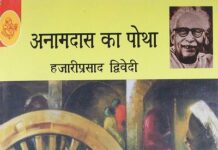I have been reading on Dwarka since the time I visited Dwarka recently. Not many books gave me any insight into the making of the city. There was one book that gave me insights into the submerged city of Dwarka as they were found by the marine archaeologists. Then I stumbled upon Dwarka ka Suryasta – a book that promised to speak about the 36 years between the Mahabharat war and the destruction of Dwarka. Dinakar Joshi is renowned Gujarati author with more than 150 books to his credit.
The fact Dwarka Ka Suryasta was available in Hindi and on Kindle was an added advantage. I was a bit apprehensive about a Hindi book on Kindle, but this one cleared any doubts that I had.
Buy Kindle from Amazon
The book starts by noticing a small fact in the story of Mahabharat that after the war, Krishna spent all his remaining 36 years in Dwarka. He never seems to have stepped out of Dwarka after that, nor did Pandavas visit him for anything. It seems there was an absolute lull or peace after the war. The author wonders what Krishna did all these days.
Read More – Dwarkadheesh Temple – History, Heritage & Architecture
We all know, that not much is known about intervening years but there are many authors have written about the last days of Krishna’s Dwarka. So, the author begins his story with from the first signs that remind Krishna of the end of 36 years of Gandhari’s curse. He gets omens in his dreams, in the sky visible from his window among other signs. He is reminded of his days in Mathura and Vrindavan.
In a conversation with Rukmini, he brings out the unfortunate fates of Devaki and himself. While everyone sees him as this happy go lucky cowherd, who is always smiling, but he feels he was denied growing up with the mother who gave him birth. Devaki, of course, has to see the death of her 7 children and separation from the eight. Sitting next to Gomti river, a whiff of air takes him back to banks of Yamuna in Vrindavan where Radha must be waiting for him even today. He recalls how she was the only one who never thought Kamsa can win him or even harm him when the rest of Gokul thought so. He, of course, remembers all the tender moments spent with her.
Read More – Beyt Dwarka – The Golden City of Mahabharat
The story goes back and forth between Dwarka and Mathura and the two can not be separated really when the man the binding them is who you are listening to. You look at the current functioning of Dwarka and then go back to times that led to a movement of Yadavas to Dwarka. In between all these, the author brings out the Krishna – a human being. You sit and listen to his emotions. He is hurt when his wife Satyabhama suspects him for stealing the Sayamantak Mani, or when he finds himself alone in the Yadav Sabha, or when he misses Radha.
The prohibition of alcohol reminded me that Dwarka is located in Gujarat – a dry state in India. It seems Alcohol was always seen as a problem here. The curses of Gandhari and Rishi Kashyap have to come together to end the Yadava Vansh that includes Sri Krishna himself.
Buy this book – Dwarka Ka Suryasta by Dinkar Joshi from Amazon
While I knew the story, it is the rendering of the story that is beautiful. It brings alive the city of Dwarka and the relationship between people like the effortless trust between Krishna and Rukmini. The Hindi is impeccable – the language keeps you grounded in the era that belongs to Krishna. For example, every character is addressed with all the prefixes that remind the reader of his lineage, achievements, and characteristics. There is a grace, elegance, and sophistication in the language makes you fall in love with it. The smoothness with which the narrative traverses landscapes both physical and psychological is delightful.

In the end, you feel the pain of Krishna, who has to witness his loved ones die before he dies. The author, however, ends the story with the death of Krishna and does not talk about the submergence of Dwarka. I was hoping that he would describe that too for the reader.
I am not sure if Dwarka Ka Suryasta is available in English. But if you can read Hindi or Gujarati, do read it both for the story and the beauty of language.
More historical fiction books to explore:
- The Glory of Patan by K M Munshi – English Translation
- The Boy from Pataliputra by Rahul Mitra
- The Devil Take Love by Sudhir Kakar
- Govinda by Krishna Udayasankar
- Cuckold by Kiran Nagarkar
- Vaishali ki Nagarvadhu by Acharya Chatursen








